Theories of Nursing: Clinical and Theoretical Perspectives
VerifiedAdded on 2019/11/26
|5
|897
|151
Essay
AI Summary
This essay provides an overview of several nursing theories and their clinical perspectives. It discusses Leininger's theory, emphasizing culturally sensitive care, and the need theory, focusing on patient recovery. The Unitary Human Theory and Self-Care Theory are also examined, highlighting the importance of patient-environment interaction and self-care knowledge. The essay further explores the clinical perspective in nursing, emphasizing the development of nursing skills and incentives for nurses. It also references the NMBA RN standards of nursing practices, detailing the nurse's responsibilities in assessment, therapeutic relationships, safety, and ethical care. The importance of applying these theories to solve patient needs and manage emergency situations is emphasized, along with references to relevant literature.
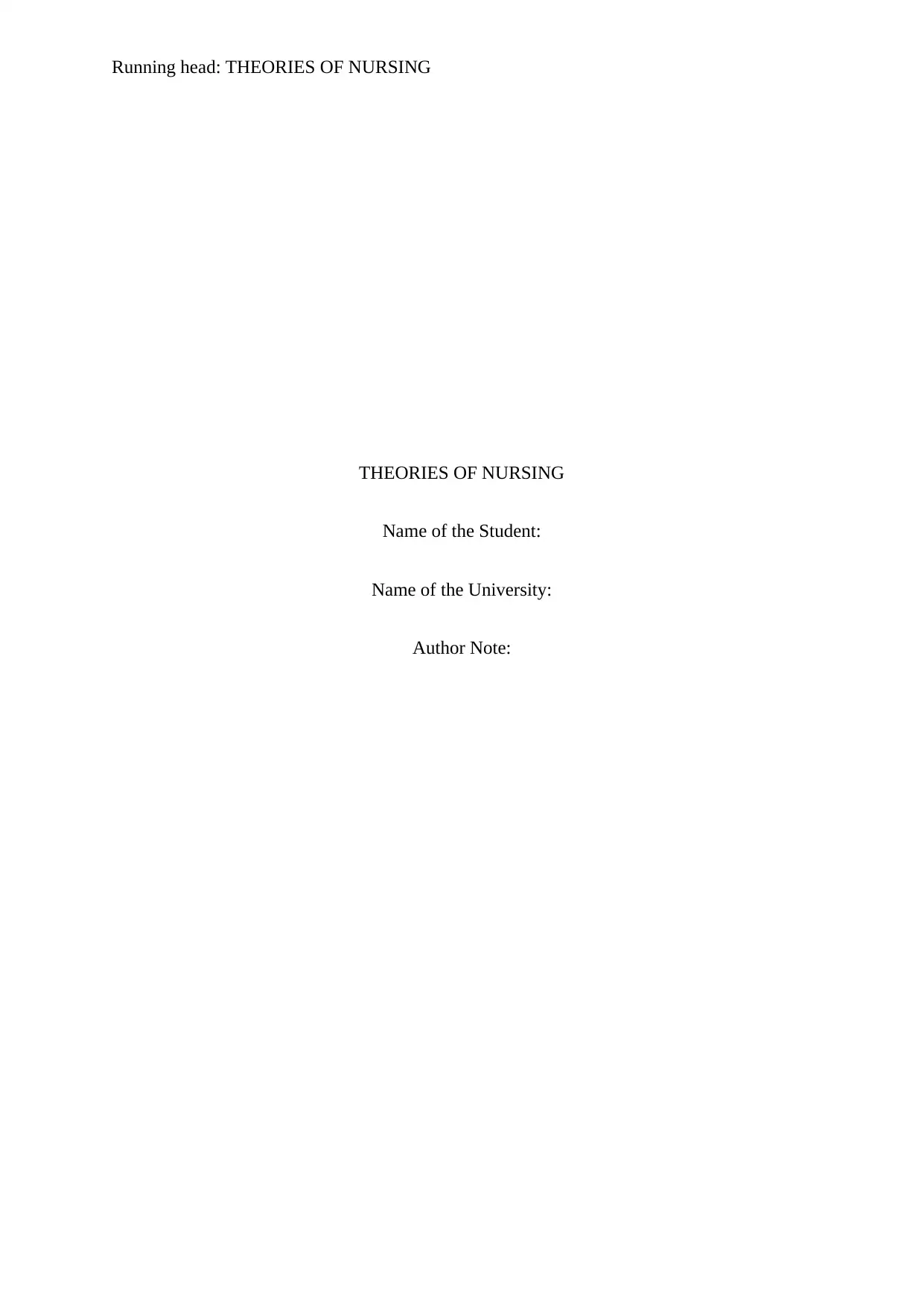
Running head: THEORIES OF NURSING
THEORIES OF NURSING
Name of the Student:
Name of the University:
Author Note:
THEORIES OF NURSING
Name of the Student:
Name of the University:
Author Note:
Paraphrase This Document
Need a fresh take? Get an instant paraphrase of this document with our AI Paraphraser
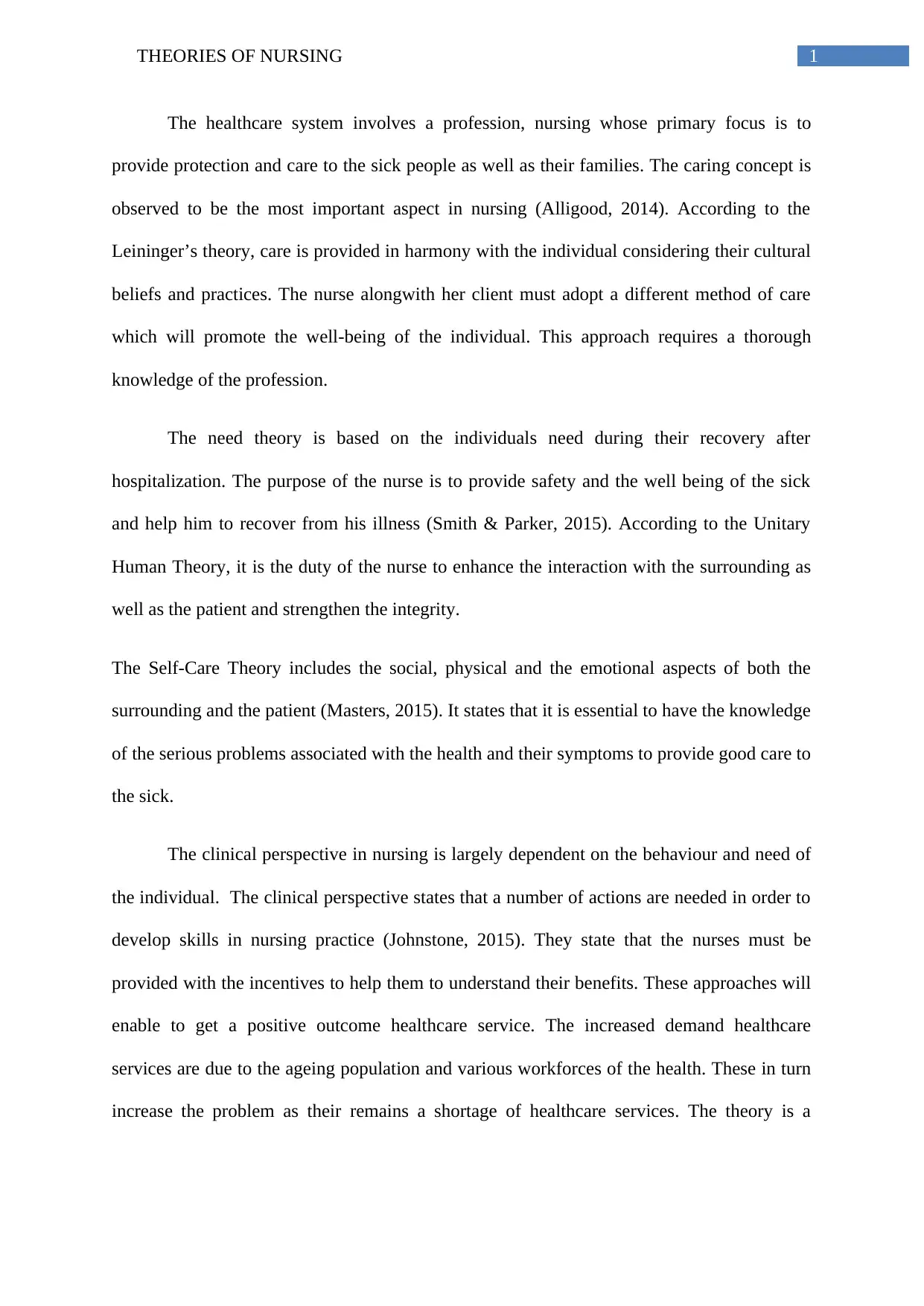
1THEORIES OF NURSING
The healthcare system involves a profession, nursing whose primary focus is to
provide protection and care to the sick people as well as their families. The caring concept is
observed to be the most important aspect in nursing (Alligood, 2014). According to the
Leininger’s theory, care is provided in harmony with the individual considering their cultural
beliefs and practices. The nurse alongwith her client must adopt a different method of care
which will promote the well-being of the individual. This approach requires a thorough
knowledge of the profession.
The need theory is based on the individuals need during their recovery after
hospitalization. The purpose of the nurse is to provide safety and the well being of the sick
and help him to recover from his illness (Smith & Parker, 2015). According to the Unitary
Human Theory, it is the duty of the nurse to enhance the interaction with the surrounding as
well as the patient and strengthen the integrity.
The Self-Care Theory includes the social, physical and the emotional aspects of both the
surrounding and the patient (Masters, 2015). It states that it is essential to have the knowledge
of the serious problems associated with the health and their symptoms to provide good care to
the sick.
The clinical perspective in nursing is largely dependent on the behaviour and need of
the individual. The clinical perspective states that a number of actions are needed in order to
develop skills in nursing practice (Johnstone, 2015). They state that the nurses must be
provided with the incentives to help them to understand their benefits. These approaches will
enable to get a positive outcome healthcare service. The increased demand healthcare
services are due to the ageing population and various workforces of the health. These in turn
increase the problem as their remains a shortage of healthcare services. The theory is a
The healthcare system involves a profession, nursing whose primary focus is to
provide protection and care to the sick people as well as their families. The caring concept is
observed to be the most important aspect in nursing (Alligood, 2014). According to the
Leininger’s theory, care is provided in harmony with the individual considering their cultural
beliefs and practices. The nurse alongwith her client must adopt a different method of care
which will promote the well-being of the individual. This approach requires a thorough
knowledge of the profession.
The need theory is based on the individuals need during their recovery after
hospitalization. The purpose of the nurse is to provide safety and the well being of the sick
and help him to recover from his illness (Smith & Parker, 2015). According to the Unitary
Human Theory, it is the duty of the nurse to enhance the interaction with the surrounding as
well as the patient and strengthen the integrity.
The Self-Care Theory includes the social, physical and the emotional aspects of both the
surrounding and the patient (Masters, 2015). It states that it is essential to have the knowledge
of the serious problems associated with the health and their symptoms to provide good care to
the sick.
The clinical perspective in nursing is largely dependent on the behaviour and need of
the individual. The clinical perspective states that a number of actions are needed in order to
develop skills in nursing practice (Johnstone, 2015). They state that the nurses must be
provided with the incentives to help them to understand their benefits. These approaches will
enable to get a positive outcome healthcare service. The increased demand healthcare
services are due to the ageing population and various workforces of the health. These in turn
increase the problem as their remains a shortage of healthcare services. The theory is a
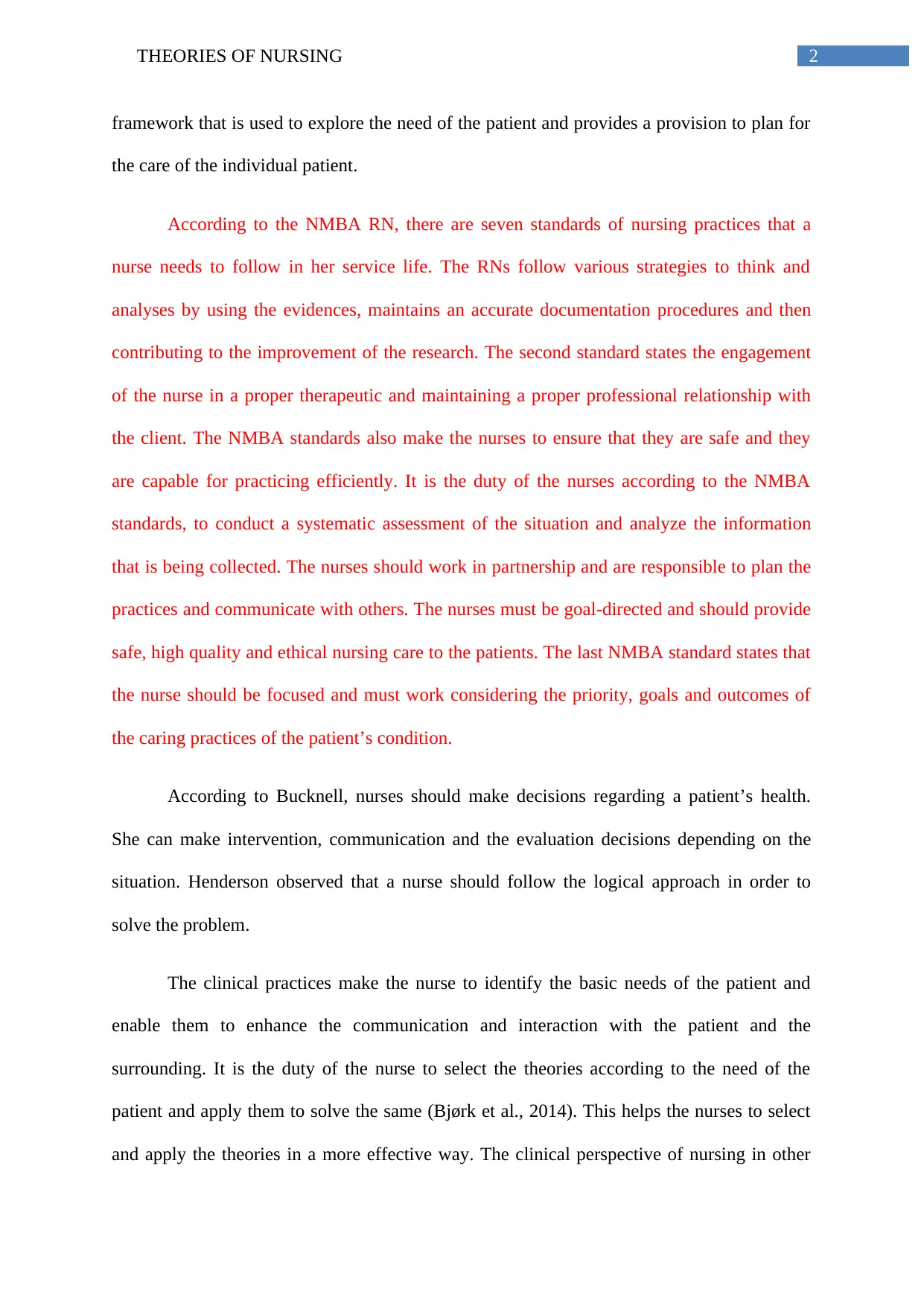
2THEORIES OF NURSING
framework that is used to explore the need of the patient and provides a provision to plan for
the care of the individual patient.
According to the NMBA RN, there are seven standards of nursing practices that a
nurse needs to follow in her service life. The RNs follow various strategies to think and
analyses by using the evidences, maintains an accurate documentation procedures and then
contributing to the improvement of the research. The second standard states the engagement
of the nurse in a proper therapeutic and maintaining a proper professional relationship with
the client. The NMBA standards also make the nurses to ensure that they are safe and they
are capable for practicing efficiently. It is the duty of the nurses according to the NMBA
standards, to conduct a systematic assessment of the situation and analyze the information
that is being collected. The nurses should work in partnership and are responsible to plan the
practices and communicate with others. The nurses must be goal-directed and should provide
safe, high quality and ethical nursing care to the patients. The last NMBA standard states that
the nurse should be focused and must work considering the priority, goals and outcomes of
the caring practices of the patient’s condition.
According to Bucknell, nurses should make decisions regarding a patient’s health.
She can make intervention, communication and the evaluation decisions depending on the
situation. Henderson observed that a nurse should follow the logical approach in order to
solve the problem.
The clinical practices make the nurse to identify the basic needs of the patient and
enable them to enhance the communication and interaction with the patient and the
surrounding. It is the duty of the nurse to select the theories according to the need of the
patient and apply them to solve the same (Bjørk et al., 2014). This helps the nurses to select
and apply the theories in a more effective way. The clinical perspective of nursing in other
framework that is used to explore the need of the patient and provides a provision to plan for
the care of the individual patient.
According to the NMBA RN, there are seven standards of nursing practices that a
nurse needs to follow in her service life. The RNs follow various strategies to think and
analyses by using the evidences, maintains an accurate documentation procedures and then
contributing to the improvement of the research. The second standard states the engagement
of the nurse in a proper therapeutic and maintaining a proper professional relationship with
the client. The NMBA standards also make the nurses to ensure that they are safe and they
are capable for practicing efficiently. It is the duty of the nurses according to the NMBA
standards, to conduct a systematic assessment of the situation and analyze the information
that is being collected. The nurses should work in partnership and are responsible to plan the
practices and communicate with others. The nurses must be goal-directed and should provide
safe, high quality and ethical nursing care to the patients. The last NMBA standard states that
the nurse should be focused and must work considering the priority, goals and outcomes of
the caring practices of the patient’s condition.
According to Bucknell, nurses should make decisions regarding a patient’s health.
She can make intervention, communication and the evaluation decisions depending on the
situation. Henderson observed that a nurse should follow the logical approach in order to
solve the problem.
The clinical practices make the nurse to identify the basic needs of the patient and
enable them to enhance the communication and interaction with the patient and the
surrounding. It is the duty of the nurse to select the theories according to the need of the
patient and apply them to solve the same (Bjørk et al., 2014). This helps the nurses to select
and apply the theories in a more effective way. The clinical perspective of nursing in other
⊘ This is a preview!⊘
Do you want full access?
Subscribe today to unlock all pages.

Trusted by 1+ million students worldwide
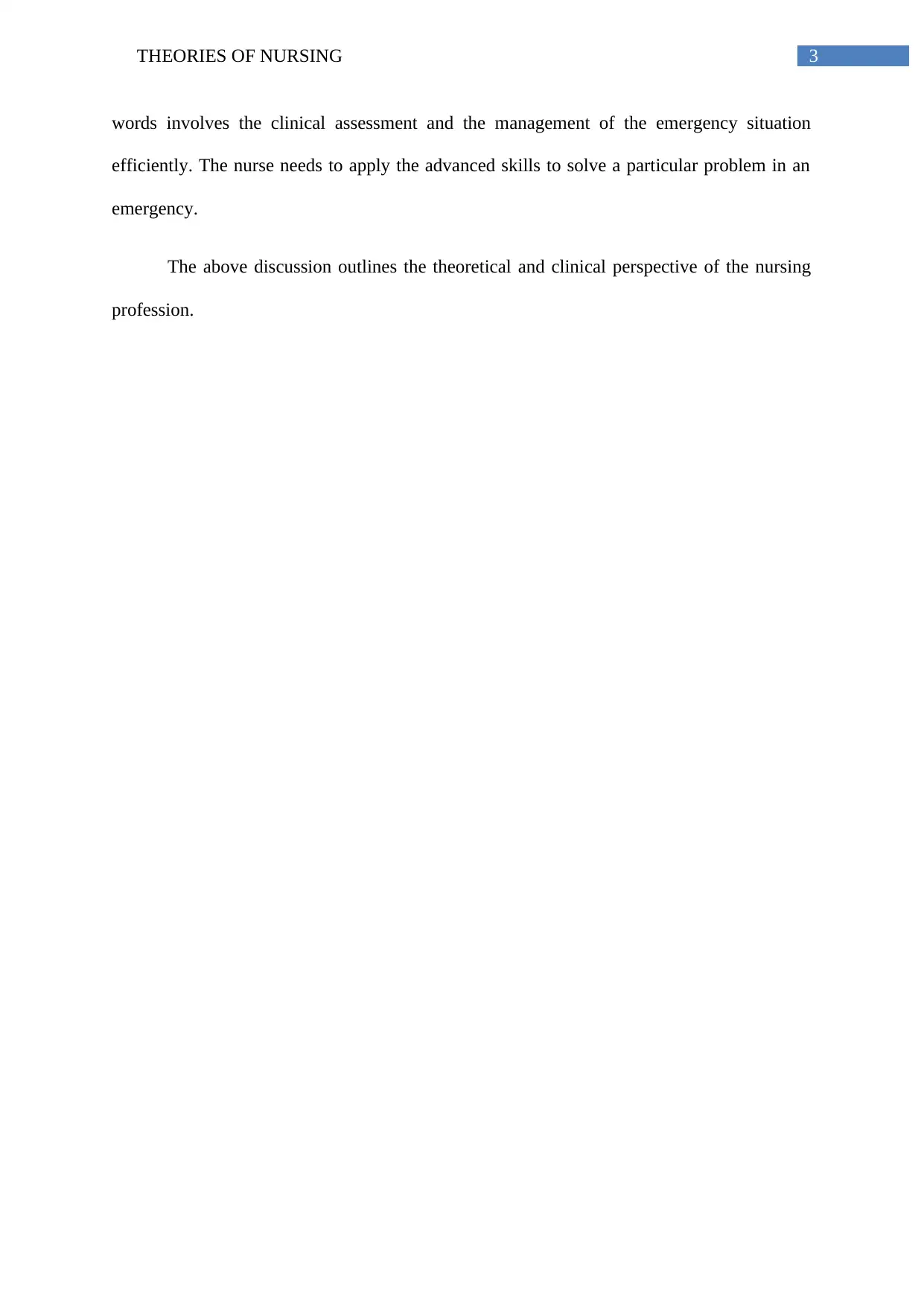
3THEORIES OF NURSING
words involves the clinical assessment and the management of the emergency situation
efficiently. The nurse needs to apply the advanced skills to solve a particular problem in an
emergency.
The above discussion outlines the theoretical and clinical perspective of the nursing
profession.
words involves the clinical assessment and the management of the emergency situation
efficiently. The nurse needs to apply the advanced skills to solve a particular problem in an
emergency.
The above discussion outlines the theoretical and clinical perspective of the nursing
profession.
Paraphrase This Document
Need a fresh take? Get an instant paraphrase of this document with our AI Paraphraser
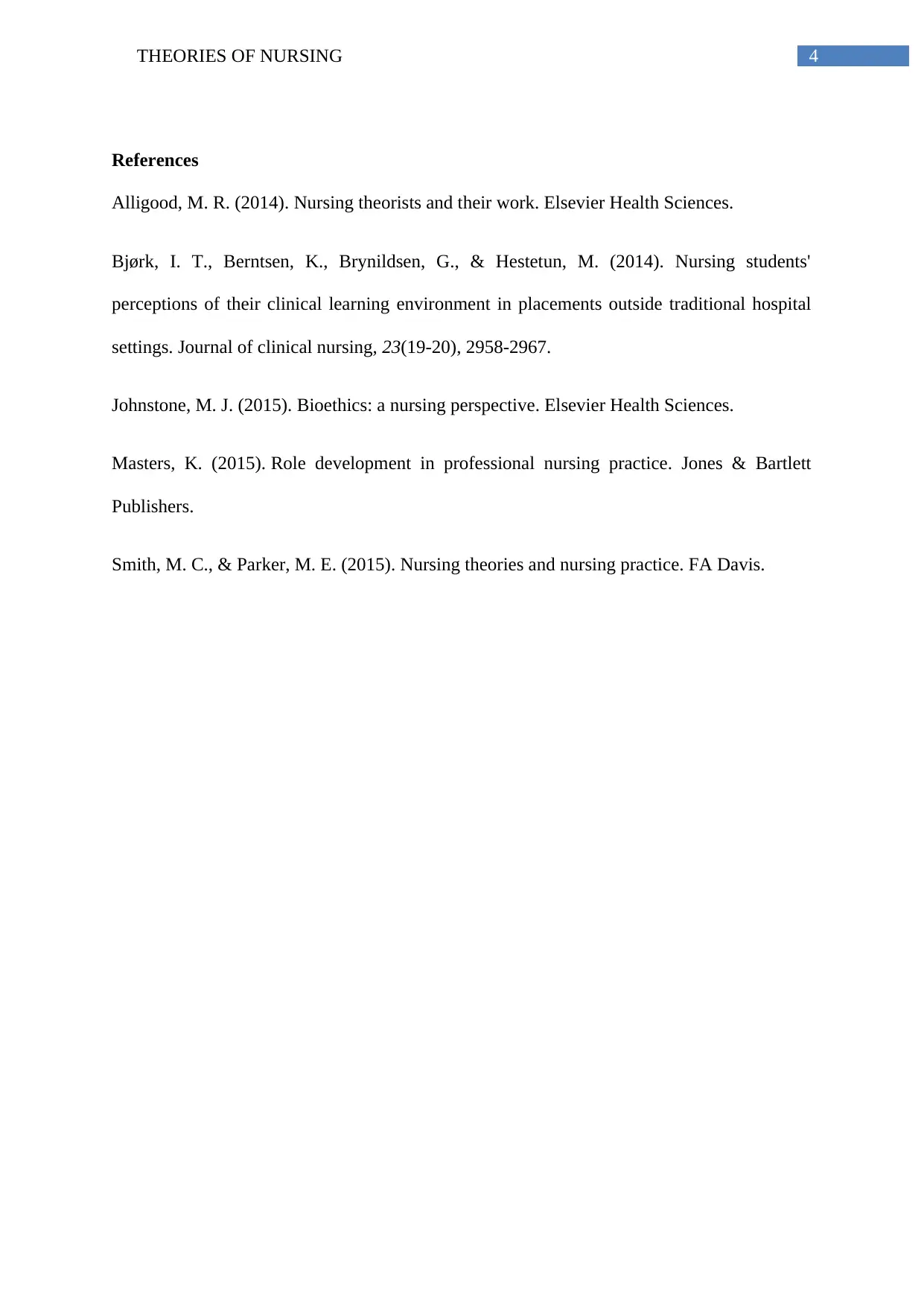
4THEORIES OF NURSING
References
Alligood, M. R. (2014). Nursing theorists and their work. Elsevier Health Sciences.
Bjørk, I. T., Berntsen, K., Brynildsen, G., & Hestetun, M. (2014). Nursing students'
perceptions of their clinical learning environment in placements outside traditional hospital
settings. Journal of clinical nursing, 23(19-20), 2958-2967.
Johnstone, M. J. (2015). Bioethics: a nursing perspective. Elsevier Health Sciences.
Masters, K. (2015). Role development in professional nursing practice. Jones & Bartlett
Publishers.
Smith, M. C., & Parker, M. E. (2015). Nursing theories and nursing practice. FA Davis.
References
Alligood, M. R. (2014). Nursing theorists and their work. Elsevier Health Sciences.
Bjørk, I. T., Berntsen, K., Brynildsen, G., & Hestetun, M. (2014). Nursing students'
perceptions of their clinical learning environment in placements outside traditional hospital
settings. Journal of clinical nursing, 23(19-20), 2958-2967.
Johnstone, M. J. (2015). Bioethics: a nursing perspective. Elsevier Health Sciences.
Masters, K. (2015). Role development in professional nursing practice. Jones & Bartlett
Publishers.
Smith, M. C., & Parker, M. E. (2015). Nursing theories and nursing practice. FA Davis.
1 out of 5
Related Documents
Your All-in-One AI-Powered Toolkit for Academic Success.
+13062052269
info@desklib.com
Available 24*7 on WhatsApp / Email
![[object Object]](/_next/static/media/star-bottom.7253800d.svg)
Unlock your academic potential
Copyright © 2020–2026 A2Z Services. All Rights Reserved. Developed and managed by ZUCOL.





